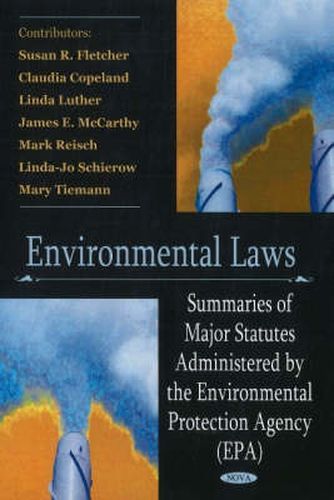Readings Newsletter
Become a Readings Member to make your shopping experience even easier.
Sign in or sign up for free!
You’re not far away from qualifying for FREE standard shipping within Australia
You’ve qualified for FREE standard shipping within Australia
The cart is loading…






Several major statutes form the legal basis for the programs of the Environmental Protection Agency (EPA). Many of these have been amended several times. The current provisions of each are briefly summarised in this report. The Pollution Prevention Act (PPA) seeks to prevent pollution through reduced generation of pollutants at their point of origin. The Clean Air Act (CAA) requires EPA to set mobile source limits, ambient air quality standards, hazardous air pollutant emission standards, standards for new pollution sources, and significant deterioration requirements; and to focus on areas that do not attain standards. The Clean Water Act (CWA) establishes a sewage treatment construction grants program, and a regulatory and enforcement program for discharges of wastes into U.S. waters. Focusing on the regulation of the intentional disposal of materials into ocean waters and authorising related research is the Ocean Dumping Act. The Safe Drinking Water Act (SDWA) establishes primary drinking water standards, regulates underground injection disposal practices, and establishes a groundwater control program. The Solid Waste Disposal Act and Resource Conservation and Recovery Act (RCRA) provide regulation of solid and hazardous waste, while the Comprehensive Environmental Response, Compensation, and Liability Act (CERCLA), or Superfund, provides authority for the federal government to respond to releases of hazardous substances, and established a fee-maintained fund to clean up abandoned hazardous waste sites. The authority to collect fees has expired, and funding is now provided from general revenues. The Emergency Planning and Community Right-to-Know Act requires industrial reporting of toxic releases and encourages planning to respond to chemical emergencies. The Toxic Substances Control Act (TSCA) regulates the testing of chemicals and their use, and the Federal Insecticide, Fungicide, and Rodenticide Act (FIFRA) governs pesticide products and their use.
$9.00 standard shipping within Australia
FREE standard shipping within Australia for orders over $100.00
Express & International shipping calculated at checkout
Several major statutes form the legal basis for the programs of the Environmental Protection Agency (EPA). Many of these have been amended several times. The current provisions of each are briefly summarised in this report. The Pollution Prevention Act (PPA) seeks to prevent pollution through reduced generation of pollutants at their point of origin. The Clean Air Act (CAA) requires EPA to set mobile source limits, ambient air quality standards, hazardous air pollutant emission standards, standards for new pollution sources, and significant deterioration requirements; and to focus on areas that do not attain standards. The Clean Water Act (CWA) establishes a sewage treatment construction grants program, and a regulatory and enforcement program for discharges of wastes into U.S. waters. Focusing on the regulation of the intentional disposal of materials into ocean waters and authorising related research is the Ocean Dumping Act. The Safe Drinking Water Act (SDWA) establishes primary drinking water standards, regulates underground injection disposal practices, and establishes a groundwater control program. The Solid Waste Disposal Act and Resource Conservation and Recovery Act (RCRA) provide regulation of solid and hazardous waste, while the Comprehensive Environmental Response, Compensation, and Liability Act (CERCLA), or Superfund, provides authority for the federal government to respond to releases of hazardous substances, and established a fee-maintained fund to clean up abandoned hazardous waste sites. The authority to collect fees has expired, and funding is now provided from general revenues. The Emergency Planning and Community Right-to-Know Act requires industrial reporting of toxic releases and encourages planning to respond to chemical emergencies. The Toxic Substances Control Act (TSCA) regulates the testing of chemicals and their use, and the Federal Insecticide, Fungicide, and Rodenticide Act (FIFRA) governs pesticide products and their use.